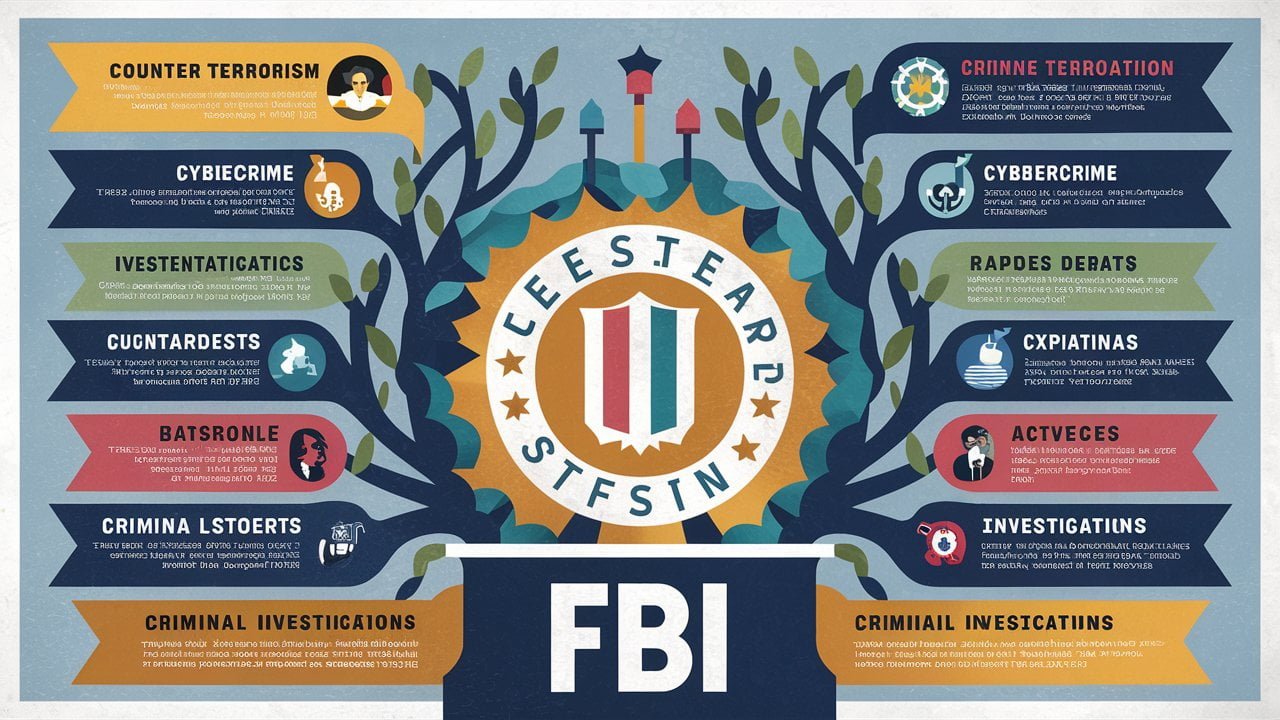The Federal Bureau of Investigation (FBI), a cornerstone of the United States law enforcement apparatus, stands as a paramount agency tasked with safeguarding national security and upholding federal laws.
A comprehensive understanding of the intricate role and multifaceted functions carried out by the FBI proves indispensable for a spectrum of professionals and researchers within the realms of law enforcement, criminal justice, governance, and academia.
As an entity defined by its unwavering commitment to preserving public safety on a grand scale, the FBI’s significance transcends mere operational boundaries, resonating profoundly in every corner that concerns itself with the maintenance of law and order at a national level.
Delving into the inner workings and operational dynamics of the FBI illuminates not only its vital contributions to ensuring societal peace but also lays bare the complex interplay between intelligence gathering, crime prevention measures, and strategic partnerships at both domestic and international levels.
This exploration uncovers a wealth of insights crucial for aspiring law enforcers, keen-eyed analysts poring over legal frameworks, governmental figures navigating policy decisions intertwined with security matters, and researchers dissecting trends in criminal behavior.
To navigate these paramount domains effectively necessitates a firm grasp on how this formidable agency orchestrates its operations—solidifying why understanding the core functions of the FBI is an educational journey with far-reaching implications for all stakeholders in the realm of justice and security.
**History of the FBI**
The Federal Bureau of Investigation (FBI) dates back to its establishment in 1908 as the Bureau of Investigation by Attorney General Charles Bonaparte. Initially focusing on investigating antitrust laws, the agency expanded its scope to include enforcing federal criminal laws. In 1935, under J. Edgar Hoover’s leadership, it was renamed the Federal Bureau of Investigation, emphasizing its enforcement role.
Through the years, key milestones have shaped the FBI into a prominent entity in law enforcement. For example, during World War II, the FBI played a crucial role in countering espionage and sabotage activities within the United States, showcasing its importance beyond domestic crime investigations.
The Civil Rights Movement of the 1960s prompted a shift in focus for the FBI towards addressing civil rights violations. This marked an era where the bureau not only handled traditional criminal cases but also took on social justice issues affecting American society.
The post-9/11 landscape mandated further evolution as counterterrorism became a primary concern. The creation of specialized units like the Counterterrorism Division underscored how external threats reshaped the FBI’s functions to adapt to modern security challenges effectively.
One significant turning point in modern history was when advancements in technology revolutionized investigative methods within the FBI. The advent of forensic science tools and digital analysis capabilities transformed how agents approached solving crimes.
These developments reflect a dynamic organizational evolution from its origins to being at the forefront of cutting-edge investigation techniques today. Understanding this historical trajectory provides context for appreciating how critical events have influenced the FBI’s mandate and operational priorities over time.
Jurisdiction and Authority.
The FBI’s jurisdiction is primarily focused on enforcing federal laws, investigating violations of federal statutes, protecting the United States from terrorist attacks, espionage, cyber-based attacks, financial crimes, and much more.
Within this broad scope of responsibility lies the FBI’s ability to investigate a wide range of criminal activities that cross state lines or have an impact at the federal level. This jurisdictional authority grants the FBI the power to intervene in cases that involve national security threats or complex criminal enterprises with a transnational reach.
In delineating its authority, the FBI operates under Title 28 of the U.S. Code and other legislative acts that provide statutory backing for its investigative powers. For example, the USA PATRIOT Act expanded the agency’s capabilities to combat terrorism by enhancing surveillance measures and information-sharing mechanisms between agencies like the CIA and NSA.
Moreover, Title 18 U.S.C., Section 3056(a) authorizes special agents in charge of field offices to conduct investigations within their territories as well as abroad when necessary for fulfilling their duties effectively.
Understanding these boundaries and legal provisions is crucial for law enforcement professionals collaborating with the FBI on cases involving federal offenses and enables them to navigate complex investigations seamlessly.
For instance, in cases where drug cartels operate across multiple states or engage in international drug trafficking, having a clear understanding of how the FBI’s jurisdiction aligns with such criminal activities ensures coordinated efforts leading to successful prosecutions.
Core Functions of the FBI.
The Federal Bureau of Investigation (FBI) undertakes several pivotal functions crucial for protecting national security and enforcing federal laws. Counterterrorism stands as one of its foremost duties, as the FBI plays a leading role in thwarting terrorist plots and dismantling extremist networks within U.S. borders.
Using specialized counterterrorism units, such as the Joint Terrorism Task Forces (JTTF), the FBI formulates strategies to prevent and respond to terrorism threats effectively. For instance, in 2011, the FBI collaborated with intelligence agencies to capture Ahmad Khan Rahimi, responsible for planting explosive devices in New York and New Jersey, showcasing their proficiency in neutralizing domestic terror risks.
In addition to countering terrorism, cybercrime investigations occupy a significant part of the FBI’s operations. As cyber threats continue to evolve and pose severe risks to national security, the agency invests resources in cybersecurity divisions dedicated to identifying and combating cyber intrusions, data breaches, and online criminal activities.
Noteworthy examples include Operation Bot Roast II in 2007, where the FBI cracked down on botnets compromising computer systems worldwide, underscoring their commitment to safeguarding digital infrastructure from malicious actors.
Furthermore, organized crime eradication is another vital function carried out by the FBI to combat criminal enterprises involved in drug trafficking, extortion, racketeering, and other illicit activities.
By targeting sophisticated criminal syndicates through comprehensive investigations and prosecutions under statutes like RICO (Racketeer Influenced and Corrupt Organizations Act), the FBI disrupts organized crime networks that undermine public safety and economic stability.
A notable case involves Operation Family Secrets in 2005 when the FBI arrested key figures linked to Chicago’s Outfit mafia organization through intensive surveillance operations and undercover tactics—a testament to their resolve in dismantling entrenched criminal hierarchies for societal welfare.
Overall, by delving into these core functions—counterterrorism efforts addressing modern security challenges; cybercrime investigations combating digital threats; and organized crime eradication safeguarding communities—the multifaceted role of the FBI becomes apparent in maintaining national security while upholding federal laws with precision and effectiveness.
Organizational Structure of the FBI.
Within the Federal Bureau of Investigation (FBI), the organizational structure is carefully designed to facilitate smooth operations and effective law enforcement. The bureau is structured into various units, prominently including field offices, operational branches, and specialized teams.
Field offices serve as local headquarters strategically spread across the United States, overseeing investigations and intelligence gathering within their designated regions. These offices act as frontline hubs for responding to threats promptly and coordinating with other federal, state, and local agencies.
Operational branches within the FBI focus on specific areas such as counterterrorism, cybercrime, white-collar crime, organized crime, and more. Each branch consists of agents with specialized expertise in their respective domains, allowing for targeted and efficient investigative efforts.
This segmented approach ensures that investigations are conducted thoroughly and comprehensively while leveraging the diverse skill sets present within the bureau. Furthermore, specialized teams within operational branches can address unique challenges like hostage rescue situations or complex financial fraud cases with agility and precision.
The structured framework of the FBI’s organizational hierarchy plays a crucial role in enhancing collaboration among different units. By delineating responsibilities clearly across various departments and teams, the bureau optimizes task distribution based on individual strengths and expertise.
This streamlined approach fosters communication channels that enable seamless coordination during joint operations or multi-agency investigations.
For instance, in high-profile cases involving national security threats or transnational criminal organizations, this collaborative model allows for swift information sharing and coordinated strategic planning to combat emerging challenges effectively.
Ultimately, this organizational structure empowers the FBI to adapt dynamically to evolving threats while upholding its mission to protect American citizens and uphold justice at every level of operation.
Partnerships and Collaborations.
Collaboration lies at the core of the FBI’s operational effectiveness, both on domestic and international fronts. Domestically, the FBI collaborates extensively with various law enforcement agencies such as the Drug Enforcement Administration (DEA), Bureau of Alcohol, Tobacco, Firearms and Explosives (ATF), and U.S. Marshals Service to combat organized crime, drug trafficking, violent crimes, and terrorism.
These partnerships allow for the pooling of resources, expertise, and intelligence to address complex criminal activities more effectively. For instance, joint task forces between the FBI and local police departments have yielded significant results in taking down criminal networks involved in drug smuggling or human trafficking.
Internationally, the FBI engages in partnerships with foreign law enforcement agencies to combat transnational crimes that pose threats to national security.
Through arrangements like Legal Attaché offices located in U.S. embassies around the world, the FBI liaises with international counterparts to coordinate investigations on terrorism, cybercrime, money laundering, and other global threats.
An exemplary instance of international collaboration is Operation Trojan Shield – a coordinated effort involving multiple countries facilitated by the FBI that dismantled a sophisticated criminal network using encrypted communication tools for illicit activities.
Furthermore, the FBI’s collaboration extends beyond traditional law enforcement entities to include partnerships with academia, private sector industries, non-governmental organizations (NGOs), and community groups.
By harnessing diverse expertise and perspectives from these sectors, the FBI enriches its investigative capabilities while also fostering trust and cooperation with broader society.
Initiatives like Infragard – a partnership program between the FBI and members of private sector organizations focusing on critical infrastructure protection – showcase how productive partnerships can enhance national security efforts by leveraging shared knowledge and resources across different spheres of society.
Technology and innovation.
Technology and innovation are integral to the FBI’s investigative capabilities, continuously evolving to keep pace with modern threats. The agency leverages advanced forensic tools that enable agents to extract valuable evidence from digital devices, aiding in solving complex cases like cybercrimes and terrorism.
For instance, through partnerships with industry experts, the FBI has access to cutting-edge software tools that can recover deleted data or trace digital footprints crucial in identifying suspects or establishing motives.
Data analytics is another critical aspect where the FBI utilizes sophisticated algorithms to analyze large volumes of information swiftly. By mining through vast datasets, agents can uncover patterns, connections, and trends that might otherwise go unnoticed.
This analytical approach proves invaluable in preempting criminal activities or detecting suspicious behaviors early on. One notable example is how the FBI used data analytics to track financial transactions linked to illicit activities, leading to successful operations against organized crime syndicates.
Surveillance technologies form a significant part of the FBI’s toolkit for monitoring suspects and gathering intelligence discreetly. From satellite imaging to advanced audio/video surveillance equipment, these technologies provide crucial real-time information during high-stakes operations such as counterterrorism efforts.
Moreover, innovations in drone technology have enhanced the FBI’s ability to conduct aerial surveillance efficiently and gather actionable intelligence without compromising agent safety. Utilizing these cutting-edge technologies ensures that the FBI remains at the forefront of combating emerging threats both within the U.S. borders and beyond.
In conclusion, technology serves as a force multiplier for the FBI, augmenting its investigative prowess while enabling swift responses to dynamic security challenges. Embracing innovation allows agents to adapt quickly to evolving criminal methodologies and stay ahead of adversaries aiming to exploit vulnerabilities in cyberspace or elsewhere.
By prioritizing technological advancements in their arsenal, the FBI demonstrates a commitment to maintaining national security interests effectively and safeguarding citizens against diverse criminal activities in the digital age.
Training and Development Programs.
The Federal Bureau of Investigation (FBI) places a strong emphasis on rigorous training protocols designed to mold aspiring agents into highly skilled professionals capable of combating complex threats. Prospective agents undergo intensive training at the FBI Academy in Quantico, Virginia.
The training curriculum covers a wide array of subjects, including but not limited to law, investigative techniques, firearms proficiency, physical fitness, and communication skills. Such comprehensive training ensures that agents are equipped with the necessary knowledge and skills to effectively carry out their duties in the field.
Furthermore, the FBI recognizes the importance of continuous learning to keep pace with evolving crime trends and technological advancements. Agents participate in ongoing professional development programs that allow them to enhance their expertise in specialized areas such as cybercrime investigations or counterterrorism tactics.
Continual education is vital for agents to adapt their strategies to combat emerging threats effectively. By investing in the continuous growth and development of its workforce, the FBI ensures that its agents remain at the forefront of law enforcement innovation.
For example, agents may engage in scenario-based simulations and immersive exercises that replicate real-world situations they might encounter during investigations. These hands-on training activities provide practical experience and foster critical thinking skills necessary for making quick decisions under pressure.
Such dynamic learning opportunities not only sharpen agents’ abilities but also instill a proactive mindset essential for tackling diverse challenges in law enforcement. Ultimately, the FBI’s commitment to robust training and development programs underscores its dedication to maintaining a highly skilled workforce capable of safeguarding national security interests effectively.
Ethical Standards and Accountability.
Within the FBI, ethical standards are foundational to every aspect of an agent’s role. Agents are held to rigorous guidelines that dictate their behavior during investigations, ensuring objectivity and integrity throughout their duties.
Upholding these ethical standards is paramount not only to maintain the credibility of the Bureau but also to protect the rights of individuals involved in investigations. For instance, agents must adhere to strict protocols regarding evidence handling, witness interviews, and information confidentiality to uphold the highest ethical standards.
To ensure accountability and transparency in its operations, the FBI has established robust mechanisms for oversight. Internal review processes and audit systems monitor agents’ actions, ensuring compliance with regulations and ethical guidelines.
Additionally, external bodies such as congressional committees and independent oversight entities play a crucial role in supervising the FBI’s activities to prevent misconduct or abuse of power. These checks and balances serve to uphold public trust in law enforcement activities by demonstrating a commitment to accountability at all levels within the organization.
A clear emphasis on ethical conduct not only guides individual agents’ behavior but also shapes the culture within the FBI as a whole. By fostering a climate of integrity and accountability, the Bureau instills public confidence in its investigative practices.
Through adherence to stringent ethical standards and robust oversight measures, the FBI upholds its commitment to impartiality and fairness in executing its mission while prioritizing respect for civil liberties and human rights.
The unwavering dedication to ethical conduct underscores the Bureau’s role as a guardian of justice within both national security efforts and law enforcement engagements.
Conclusion: Significance of Understanding the Role and Functions of the FBI.
Understanding the intricate role and functions of an esteemed organization like the Federal Bureau of Investigation (FBI) is instrumental in shedding light on the complexities and nuances that underpin US national security efforts.
By delving into the core functions, history, jurisdictional boundaries, organizational structure, technological advancements, training protocols, ethical standards, and collaborative initiatives spearheaded by the FBI, stakeholders in law enforcement agencies, criminal justice sectors, government bodies, and research realms gain invaluable insights into safeguarding public safety effectively.
Through a comprehensive comprehension of how the FBI operates and collaborates across various domains to combat threats ranging from terrorism to cybercrimes, individuals can foster enhanced coordination among diverse sectors involved in ensuring national security.
Knowledge about the functioning of this pivotal agency not only bolsters professional practices within law enforcement but also serves as a cornerstone for collective efforts aimed at upholding federal laws, preserving public trust through transparent operations, and ultimately fortifying the safety and well-being of citizens.
In essence, grasping the multifaceted role and functions of the FBI is key to fostering synergy among different entities towards a safer tomorrow.




